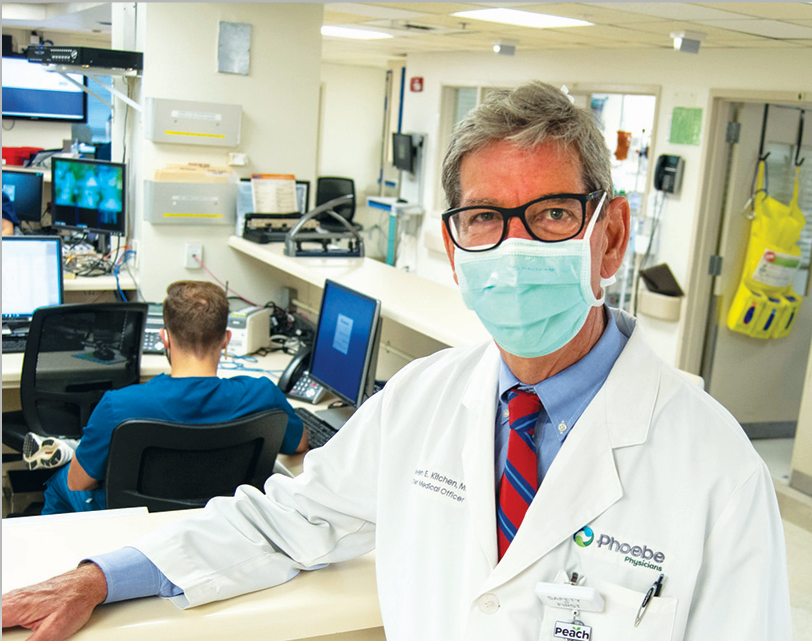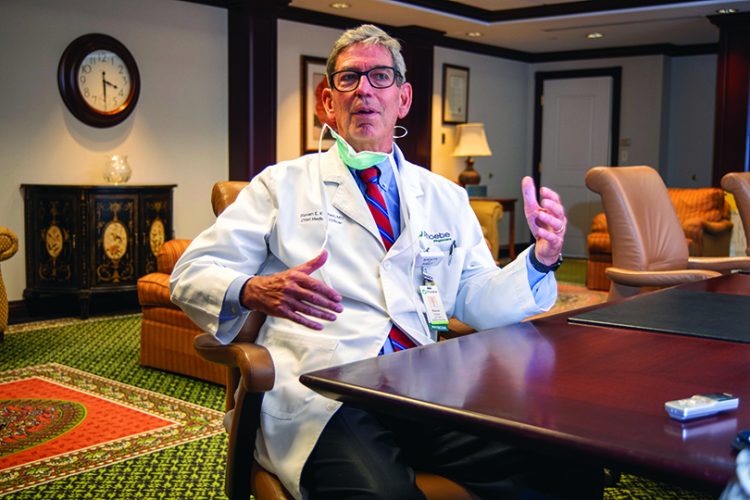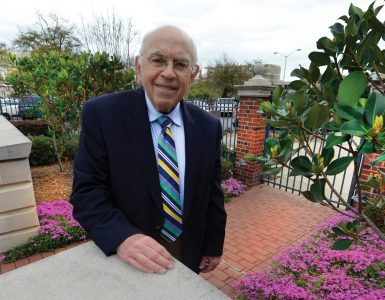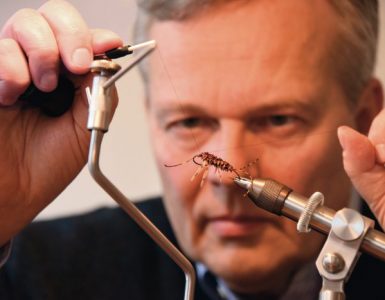March 10, 2020 started like any other Tuesday morning at Phoebe Putney Memorial Hospital in Albany, Georgia.
The hospital’s Medical Executive Committee was scheduled for its monthly meeting, but before (recently retired) Chief Medical Officer Dr. Steven Kitchen, ’85, could get there, one of the hospital’s critical care physicians made a call to him that would change everything from that day forward.
That physician had just been notified that a gentleman from Atlanta who had been in Phoebe’s ICU with shortness of breath in late February, before being transferred back to a hospital in his hometown, had just tested positive for the novel coronavirus.
That patient was one of Georgia’s earliest confirmed cases of SARS-CoV-2 infection and Georgia’s first death related to COVID-19.
“Immediately we thought ‘Oh gosh. We have a lot of staff who have been exposed,’” Kitchen remembers. “I quickly called our health system CEO Scott Steiner and told him ‘Houston. I think we have a problem.’”
Like the rest of the world watching the novel coronavirus, Kitchen and the rest of the health care team at Phoebe already knew it was a matter of when, not if, it would arrive in Albany, the seat of largely rural Dougherty County located about 40 miles from the nearest interstate.
“We, like many community hospitals our size, tried to be proactive and intentional throughout December and January, in terms of having our emergency management team already activated,” Kitchen says. “We looked at our infection prevention policies, our inventory of PPE, physical environment and staffing contingencies. We felt relatively well positioned at that point.”
What they couldn’t have predicted then was how the virus would get to Albany, the speed and magnitude of spread within the community and the devastating impact on those patients infected with the virus. They couldn’t have known how the Albany area with a population of around 90,000, people would become one of the nation’s COVID-19 hotspots. Business Insider reported in early April that Albany was the fourth-worst hit area in the country per capita, with 659 cases for every 100,000 people.
A crisis of epic proportion
In late February, there had been two funerals in town. They were crowded events — family and friends, from Albany and from out of town, stood in crowded funeral homes and churches to mourn. The gentleman from Atlanta had been in town to attend one of the services.
The virus was there too.
The funerals turned out to be what are now called super-spreader events, when a single person infects a large number of other people or when a large gathering is linked to a large number of cases.
It wasn’t until several weeks later, in mid-March, that the Centers for Disease Control and Prevention even issued the first guidelines, limiting gatherings to 50 people or less, giving the virus plenty of time to spread in the tight-knit community.
Within hours of that initial phone call informing him of the Atlanta man’s diagnosis, Kitchen and the leadership team got to work figuring out which staff had been in contact with the patient during his stay in the ICU.
Within 12 hours a patient with the virus showed up in the emergency room. Within 24 hours there were four more. “That is when we had our first inkling that there was something major going on here,” Kitchen says.
Steiner quickly turned the hospital’s administrative conference room into an incident command center where Kitchen and the rest of the senior leadership team essentially began living nearly 16 hours a day. On a far wall there was a board where they listed the initials and order of each person admitted with the virus.
They began to connect patients and see patterns — people in the same families were quickly developing symptoms — fever, chills, cough, shortness of breath. As evidenced by the sheer numbers of people showing up at Phoebe, it was clear the virus was already spreading like a fire through the community, quickly jumping from one house to the next.
“We knew we were facing a crisis of epic proportion,” Kitchen says. “We knew we had to act quickly and that we had to be intentional and proactive in our decisions about where we were going to place these patients. We knew we’d want to physically cohort them in one area if we could,” to prevent further spread to other patients in the hospital and to frontline staff.
There are nine patient care floors at Phoebe, a 691-bed facility that serves as a teaching hospital for MCG’s first regional campus. The 8th floor is a 36-bed general medical unit with an additional 12-bed medical intensive care unit. “Chief Nursing Officer (Evelyn Olenick) and I talked about it, we said that floor would be well designed for this. We naively thought that would be more than enough,” he remembers, shaking his head.
Within days, every bed on the floor was full. The emergency room was overrun.
“We learned quickly that we had to be very nimble, we had to start thinking in a different way,” Kitchen says. “If we were filling up 36 medical beds and 12 in the ICU, what do we do next?”
They quickly turned the 3rd floor into a COVID-19 unit. Then the 6th.
Still not able to absorb all the cases they had, they converted another small medical unit to a makeshift ICU and turned the postanesthesia care unit into the hospital’s only non-COVID ICU.
In a matter of weeks, four general medical units had been converted to COVID units. All of the hospital’s 38 ICU beds were filled with patients who had the virus. The hospital had gone through a six-month supply of PPE in two weeks.
Elective procedures were canceled. Visitors were restricted.
Patients with SARS-CoV-2 were showing up at what Kitchen calls an “unfathomable pace.”
And many were getting very sick, very quickly. Many people coming into the emergency room were already in full respiratory distress. Patients who made it past the ER could decompensate in a matter of minutes once they made it to the units.
“I remember very clearly getting a call about 11 p.m. one night from one of our hospitalists who was working on the 8th floor,” Kitchen says. “You could just sense, I won’t say terror, but something in his voice conveyed a sense of urgency. The ICUs were full, but we had patient after patient going into respiratory failure. That is not something you can manage from afar, so I got up, came in and supported the efforts of our hospitalists, intensivists, nurses, respiratory therapists and CRNAs as they worked together in heroic fashion, intubating five patients on a single nursing unit that night.”
While there’s no perfect answer as to why people were showing up so critically ill, Kitchen says it was likely a confluence of things — the two funerals were largely attended by people who were older with chronic health conditions, placing them at increased risk for severe illness due to the virus.

Proud, not helpless
It would have been easy to become overwhelmed in those early days. “At the height we admitted 30 people with the virus a day,” he says. “I remember having 160 patients in the hospital with COVID at one time.”
It would have been easy to feel helpless plenty of times too, he acknowledges.
Like when during rounds in a makeshift ICU, Kitchen ran into a visibly distraught nurse leaving the room where she had just FaceTimed with a husband, so he could see and talk to his wife of 40-years as she succumbed to the virus.
Or when he watched his hospital’s chaplain, Will Runyon, stay with patient after patient as they passed, day in and day out, because visitor restrictions meant their families couldn’t be there to hold their hands, so he did, “with remarkable compassion and courage.”
Or when he thought of his and his family’s own health and safety – intentionally changing clothes and taking a shower every time he returned home.
“I can’t say that I ever seriously feared for their safety. I think you’re so consumed in the moment, I think we shift into a crisis mode,” Kitchen says. “You do what you have to do in the moment.”
A believer in the adage that the character of people and places is not truly revealed during easy times, but rather during times of hardship and adversity, he says there were far more moments that made him proud, rather than fearful or helpless.
Those are the images he says that will stay ingrained in him forever.
Like when he arrived at the MICU on the 8th floor, which he called ground zero during the height of the pandemic. “Every patient on that floor was critically ill,” he remembers. “I was up there rounding. Everyone was doing the best they could but it was just very challenging. The elevator doors open up and there are two of our critical care advanced practice providers and one of our critical care physicians who were assigned to another unit and they had come there, just to help. It was true comradery.”
Or when surgeons whose elective cases were canceled came to the ICUs volunteering to do rounds, put in central lines, whatever they could to help.
Or when hospitals across Georgia, including MCG and its teaching hospitals Augusta University Health, reached out and told him “We’ll do whatever we can to help. Send us some of your patients.”
Or when he watched one of the first patients admitted with SARS-CoV-2, a Black female who had spent three long months in the ICU, be wheeled through lined hallways of cheering hospital employees, to the front door of the hospital and walk to the car where her husband waited to take her home.
“It’s really difficult to express,” he says, taking an almost tearful pause. “When you’re facing the worst, I believe you absolutely see the best in people. All the problems that you hear about and all the problems in medicine and health care, those melt away. In a crisis, what you find is that people respond.”
The other side
As mask-wearing and social distancing became the norm, Kitchen says the number of cases began to steadily decline the latter part of May and the hospital hit its nadir of around 30 patients in early June. Save for a second surge around July 4th, when many likely attended barbecues and other family gatherings and patient numbers grew to around 60-70, the numbers stayed fairly stable into late November and then, as in many other parts of the country, they again began to climb.
“Eventually we will get on the other side of it,” he says. “We all yearn for a state of normalcy at this point but also must reconcile to ourselves that this will be with us for a while. At the same time we all are called upon to adapt and learn from this.”
Part of that learning will be the focus of a new research collaborative between MCG and Phoebe, designed to take a long-term look at some of the persisting questions and lasting effects of this novel virus.
“We had, several months ago, 700 patients that had been admitted with COVID at Phoebe,” Kitchen says. “From a research standpoint, there are so many rich opportunities.”
Research will focus on things like the epidemiology of the disease — why Blacks were disproportionately affected by the disease (see page 28). At Phoebe, 80% of the people admitted were Black.
Other research will focus on the long-term neurological implications of COVID. Still other work on the implications of being intubated long-term. “We certainly have a better understanding of the acute management of COVID, but in terms of what the long-term sequela will be, there’s a lot of unwritten chapters,” Kitchen says.
More About Dr. Steven Kitchen
The native of Atlanta moved to Albany after completing his OB/GYN residency in 1989 at Baltimore’s MedStar Franklin Square Medical Center. He and his wife Kay, also an Atlanta native and 1985 MCG graduate who practices internal medicine, say the people of Albany were what made them fall in love with the area. “We were just really impressed by the medical community,” Steven Kitchen says. “I didn’t expect to see all the services here and so it just stuck out to us.”
He was appointed CMO at Phoebe in 2014.
Like many other graduates, Kitchen says MCG optimally prepared him for clinical practice. “MCG did an absolutely outstanding job preparing me and my classmates to be physicians,” he says. “I will never forget when I was a first-year OB/GYN resident in Baltimore, it became very obvious, compared to other interns, there was just nothing that I didn’t feel prepared for. That’s just a huge source of pride. I think the medical college does an outstanding job of preparing young physicians for practice.”
Before COVID-19, Kitchen had decided to step down as Phoebe CMO in early 2021. “I have no immediate plans after stepping down, and may decide retirement suits me perfectly,” he says. “On the other hand, I may find something that really peaks my interest on a part-time basis. I am truly looking forward to having the opportunity to take some time off and pursue other interests. I have found my last six years as CMO to have been tremendously rewarding and fulfilling, but it truly seems like the right time.”










